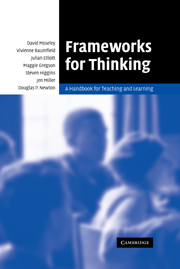Book contents
- Frontmatter
- Contents
- List of figures
- List of tables
- Notes on authors
- Foreword
- Acknowledgments
- Introduction
- 1 The nature of thinking and thinking skills
- 2 Lists, inventories, groups, taxonomies and frameworks
- 3 Frameworks dealing with instructional design
- 4 Frameworks dealing with productive thinking
- 5 Frameworks dealing with cognitive structure and/or development
- 6 Seven ‘all-embracing’ frameworks
- 7 Moving from understanding to productive thinking: implications for practice
- References
- Index
6 - Seven ‘all-embracing’ frameworks
Published online by Cambridge University Press: 22 September 2009
- Frontmatter
- Contents
- List of figures
- List of tables
- Notes on authors
- Foreword
- Acknowledgments
- Introduction
- 1 The nature of thinking and thinking skills
- 2 Lists, inventories, groups, taxonomies and frameworks
- 3 Frameworks dealing with instructional design
- 4 Frameworks dealing with productive thinking
- 5 Frameworks dealing with cognitive structure and/or development
- 6 Seven ‘all-embracing’ frameworks
- 7 Moving from understanding to productive thinking: implications for practice
- References
- Index
Summary
Introduction
The frameworks included in this chapter are ambitious in scope in that they seek to provide a comprehensive account of how people think and learn in a broad range of contexts. Four of them cover the psychomotor as well as the cognitive domain and all present a ‘whole-person’ psychological account of thinking and learning, in that they deal with motivational influences as well as with the structure of cognition. While they tend to treat thinking and learning in terms of individual psychology, in four frameworks (those of Romiszowski, Wallace and Adams, Jonassen and Tessmer, and Hauenstein) the domain of social learning is also considered.
Another common feature of these frameworks is that they all use metacognition and self-regulation (or closely-related ideas) as explanatory constructs, whether the authors are psychologists or educators. Rather than simply listing skills or skill areas, the authors of these frameworks are concerned with the deliberate use of skills in problem-solving, decision-making and other forms of productive thinking, especially when that use is planned, monitored and evaluated.
There is an inevitable amount of overlap between the frameworks for thinking that we have classified as ‘all-embracing’ and those assigned to other family groups. However, the ‘all-embracing’ frameworks can be distinguished from most members of the critical thinking' family in that they are not simply concerned with ‘higher-order’ thinking, but also deal with acquiring and building knowledge and understanding through action, sensation, perception and memory.
- Type
- Chapter
- Information
- Frameworks for ThinkingA Handbook for Teaching and Learning, pp. 250 - 295Publisher: Cambridge University PressPrint publication year: 2005



